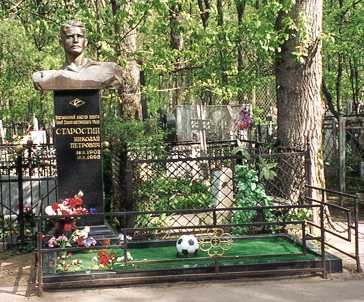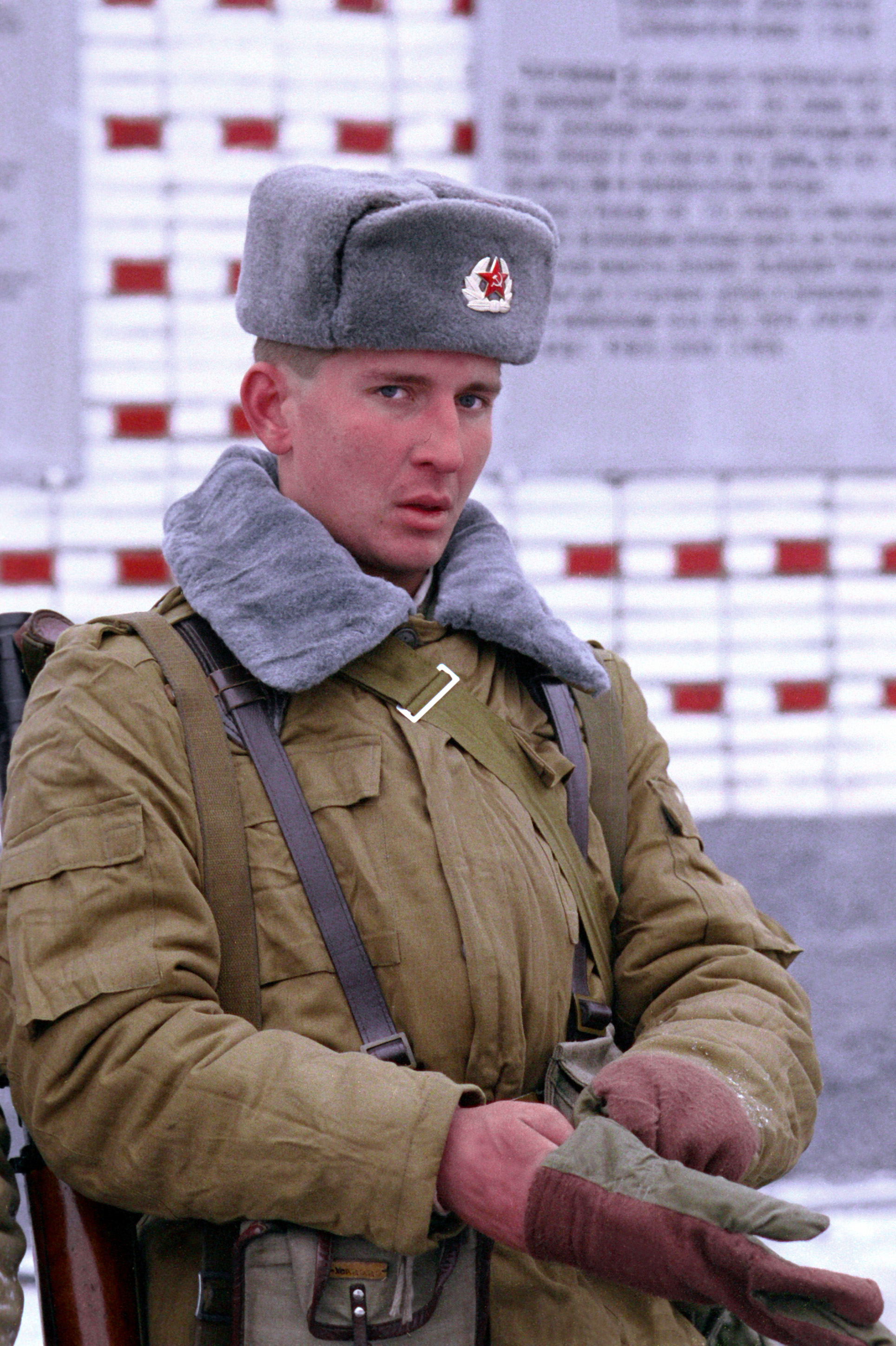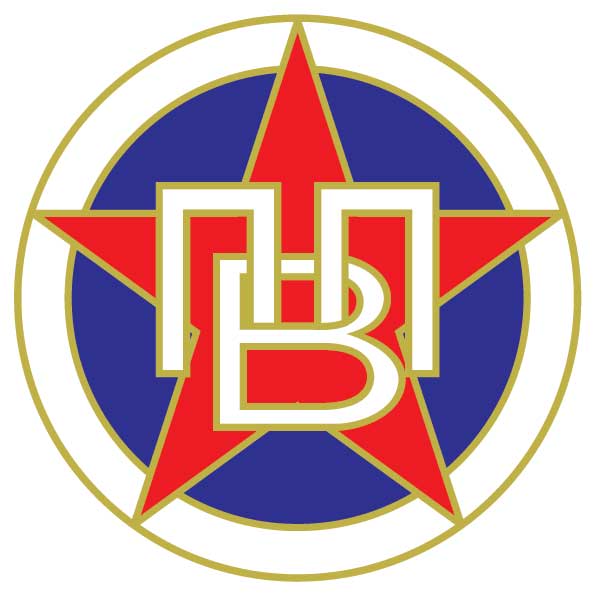|
Nikolai Starostin
Nikolai Petrovich Starostin (Cyrillic: Никола́й Петро́вич Ста́ростин; 26 February 1902 – February 17, 1996) was a Soviet footballer and ice hockey player, and founder of Spartak Moscow. Early life and Spartak Moscow The eldest of four brothers, Starostin was born in Presnensky District, Moscow where he enjoyed a comfortable upbringing courtesy of his father's reasonably well paid job as a hunting guide for the Imperial Hunting Society. Nikolai studied at a commercial academy where he first began playing football. Football was a minor concern in Russia in this period, but it was growing. A Moscow league had been founded in 1910 but this died away in the years following the revolution of 1917. Starostin is said to have welcomed the revolution, though he played no active role in it. Following the death of his father from typhoid in 1920, Starostin supported his family by playing football in the summer and ice hockey in the winter. Riordan, Jim. The stran ... [...More Info...] [...Related Items...] OR: [Wikipedia] [Google] [Baidu] |
Nikolai Starostin2
Nikolai or Nikolay is an East Slavic variant of the masculine name Nicholas. It may refer to: People Royalty * Nicholas I of Russia (1796–1855), or Nikolay I, Emperor of Russia from 1825 until 1855 * Nicholas II of Russia (1868–1918), or Nikolay II, last Emperor of Russia, from 1894 until 1917 * Prince Nikolai of Denmark (born 1999) Other people Nikolai * Nikolai Aleksandrovich (other) or Nikolay Aleksandrovich, several people * Nikolai Antropov (born 1980), Kazakh former ice hockey winger * Nikolai Berdyaev (1874–1948), Russian religious and political philosopher * Nikolai Bogomolov (born 1991), Russian professional ice hockey defenceman * Nikolai Bukharin (1888–1938), Bolshevik revolutionary and Soviet politician * Nikolai Bulganin (1895–1975), Soviet politician and minister of defence * Nikolai Chernykh (1931–2004), Russian astronomer * Nikolai Dudorov (1906–1977), Soviet politician * Nikolai Dzhumagaliev (born 1952), Soviet serial killer * Nikolai Goc ( ... [...More Info...] [...Related Items...] OR: [Wikipedia] [Google] [Baidu] |
Great Purge
The Great Purge, or the Great Terror (), also known as the Year of '37 () and the Yezhovshchina ( , ), was a political purge in the Soviet Union that took place from 1936 to 1938. After the Assassination of Sergei Kirov, assassination of Sergei Kirov by Leonid Nikolaev in 1934, Joseph Stalin launched a series of show trials known as the Moscow trials to remove suspected party dissenters from the Communist Party of the Soviet Union, especially those aligned with the Bolsheviks, Bolshevik party. The term "great purge" was popularized by the historian Robert Conquest in his 1968 book ''The Great Terror (book), The Great Terror'', whose title was an allusion to the French Revolution's Reign of Terror. The purges were largely conducted by the NKVD (People's Commissariat for Internal Affairs), which functioned as the Ministry of home affairs, interior ministry and secret police of the USSR. Starting in 1936, the NKVD under chief Genrikh Yagoda began the removal of the central pa ... [...More Info...] [...Related Items...] OR: [Wikipedia] [Google] [Baidu] |
Order Of Lenin
The Order of Lenin (, ) was an award named after Vladimir Lenin, the leader of the October Revolution. It was established by the Central Executive Committee on 6 April 1930. The order was the highest civilian decoration bestowed by the Soviet Union. The order was awarded to: * Civilians for outstanding services rendered to the State * Members of the armed forces for exemplary service * Those who promoted friendship and cooperation between people and in strengthening peace * Those with meritorious services to the Soviet state and society From 1944 to 1957, before the institution of specific length of service medals, the Order of Lenin was also used to reward 25 years of conspicuous military service. Those who were awarded the titles "Hero of the Soviet Union" and "Hero of Socialist Labour" were also given the order as part of the award. It was also bestowed on cities, companies, factories, regions, military units, and ships. Various educational institutions and military units w ... [...More Info...] [...Related Items...] OR: [Wikipedia] [Google] [Baidu] |
Antwerpen
Antwerp (; ; ) is a city and a municipality in the Flemish Region of Belgium. It is the capital and largest city of Antwerp Province, and the third-largest city in Belgium by area at , after Tournai and Couvin. With a population of 565,039, it is the most populous municipality in Belgium, and with a metropolitan population of over 1.2 million people, the country's second-largest metropolitan area after Brussels. Definitions of metropolitan areas in Belgium. Flowing through Antwerp is the river Scheldt. Antwerp is linked to the North Sea by the river's Westerschelde estuary. It is about north of Brussels, and about south of the Dutch border. The Port of Antwerp is one of the biggest in the world, ranking second in Europe after Rotterdam and within the top 20 globally. The city is also known as the hub of the world's diamond trade. In 2020, the Globalization and World Cities Research Network rated Antwerp as a Gamma + (third level/top tier) Global City. Both economically ... [...More Info...] [...Related Items...] OR: [Wikipedia] [Google] [Baidu] |
1937 Workers' Summer Olympiad
The 1937 Workers' Summer Olympiad was the sixth edition of International Workers' Olympiads. The games were held from 25 July to 1 August at Antwerp in Belgium. They were originally planned for Barcelona 1936, but cancelled due to the outbreak of the Spanish Civil War. 1937 Olympiad was a joint event with the Red Sport International organized Spartakiads. It was the first time as a delegation from Soviet Union took part at the Workers' Olympiad. German athletes no longer participated since the Workers' Gymnastics and Sports Federation of Germany had been banned by the Nazi regime in 1933. Sports * Athletics *Basketball *Basque pelota *Boxing *Chess *Cycling * Field handball (') *Football ('' details'') *Gymnastics * Motor cycling *Swimming *Table tennis *Tennis *Tug of War *Volleyball *Water polo *Weightlifting *Wrestling Wrestling is a martial art, combat sport, and form of entertainment that involves grappling with an opponent and striving to obtain a position of a ... [...More Info...] [...Related Items...] OR: [Wikipedia] [Google] [Baidu] |
Lavrenty Beria
Lavrentiy Pavlovich Beria ka, ლავრენტი პავლეს ძე ბერია} ''Lavrenti Pavles dze Beria'' ( – 23 December 1953) was a Soviet politician and one of the longest-serving and most influential of Joseph Stalin's secret police chiefs, serving as head of the People's Commissariat for Internal Affairs (NKVD) from 1938 to 1946, during the country's involvement in the Second World War. An ethnic Georgian, Beria enlisted in the Cheka in 1920, and quickly rose through its ranks. He transferred to Communist Party work in the Caucasus in the 1930s, and in 1938 was appointed head of the NKVD by Stalin. His ascent marked the end of the Stalinist Great Purge carried out by Nikolai Yezhov, whom Beria purged. After the Soviet invasion of Poland in 1939, Beria organized the Katyn massacre of 22,000 Polish officers and intelligentsia, and after the occupation of the Baltic states and parts of Romania in 1940, he oversaw the deportations of hundreds ... [...More Info...] [...Related Items...] OR: [Wikipedia] [Google] [Baidu] |
Soviet Army
The Soviet Ground Forces () was the land warfare service branch of the Soviet Armed Forces from 1946 to 1992. It was preceded by the Red Army. After the Soviet Union ceased to exist in December 1991, the Ground Forces remained under the command of the Commonwealth of Independent States until it was formally abolished on 14 February 1992. The Soviet Ground Forces were principally succeeded by the Russian Ground Forces in Russian territory. Outside of Russia, many units and formations were taken over by the post-Soviet states; some were withdrawn to Russia, and some dissolved amid conflict, notably in the Caucasus. While the Ground Forces are commonly referred to in English language sources as the Soviet Army, in Soviet military parlance the term '' armiya'' (army) referred to the combined land and air components of the Soviet Armed Forces, encompassing the Ground Forces as well as the Strategic Rocket Forces, the Air Defence Forces, and the Air Forces. After World W ... [...More Info...] [...Related Items...] OR: [Wikipedia] [Google] [Baidu] |
PFC CSKA Moscow
Professional Football Club CSKA (, derived from the historical name 'Центральный спортивный клуб армии', English language, English: ''Central Sports Club of the Army''), commonly referred to as CSKA Moscow or ''CSKA Moskva'' outside of Russia, or simply as CSKA (), is a Russian professional association football, football club. It is based in Moscow, playing its home matches at the 30,000-capacity VEB Arena. It plays in red and blue colours, with various plain and striped patterns having been used. Founded in 1911, CSKA is one of the oldest football clubs in Russia and it had its most successful period after World War II with five titles in six seasons. It won a total of 7 Soviet Top League championships and 5 Soviet Cups, including the Double (association football), double in the last season in 1991 Soviet Top League, 1991. The club has also won 6 Russian Premier League titles as well as 8 Russian Cup (football), Russian Cups. CSKA Moscow became th ... [...More Info...] [...Related Items...] OR: [Wikipedia] [Google] [Baidu] |
NKVD
The People's Commissariat for Internal Affairs (, ), abbreviated as NKVD (; ), was the interior ministry and secret police of the Soviet Union from 1934 to 1946. The agency was formed to succeed the Joint State Political Directorate (OGPU) secret police organization, and thus had a monopoly on intelligence and state security functions. The NKVD is known for carrying out political repression and the Great Purge under Joseph Stalin, as well as counterintelligence and other operations on the Eastern Front of World War II. The head of the NKVD was Genrikh Yagoda from 1934 to 1936, Nikolai Yezhov from 1936 to 1938, Lavrentiy Beria from 1938 to 1946, and Sergei Kruglov in 1946. First established in 1917 as the NKVD of the Russian SFSR, the ministry was tasked with regular police work and overseeing the country's prisons and labor camps. It was disbanded in 1930, and its functions dispersed among other agencies before being reinstated as a commissariat of the Soviet Union ... [...More Info...] [...Related Items...] OR: [Wikipedia] [Google] [Baidu] |
Spartacus
Spartacus (; ) was a Thracians, Thracian gladiator (Thraex) who was one of the Slavery in ancient Rome, escaped slave leaders in the Third Servile War, a major Slave rebellion, slave uprising against the Roman Republic. Historical accounts of his life come primarily from Plutarch and Appian, who wrote more than a century after his death. Plutarch's ''Life of Marcus Licinius Crassus, Crassus'' and Appian's ''Civil Wars'' provide the most comprehensive details of the slave revolt. Despite being a significant figure in Roman history, no contemporary sources exist, and all accounts were by those not directly involved, significantly later, and without perspectives from slaves or eyewitnesses. Little is known about him beyond the events of the war, and surviving accounts are contradictory. All sources agree he was a former gladiator and accomplished military leader. Spartacus is described as a Thracian by birth, possibly from the Maedi tribe. Before his enslavement and role as a gl ... [...More Info...] [...Related Items...] OR: [Wikipedia] [Google] [Baidu] |
Sportsperson
An athlete is most commonly a person who competes in one or more sports involving physical strength, speed, power, or endurance. Sometimes, the word "athlete" is used to refer specifically to sport of athletics competitors, i.e. including track and field and marathon runners but excluding e.g. swimmers, footballers or basketball players. However, in other contexts (mainly in the United States) it is used to refer to all athletics (physical culture) participants of any sport. For the latter definition, the word sportsperson or the gendered sportsman or sportswoman are also used. A third definition is also sometimes used, meaning anyone who is physically fit regardless of whether they compete in a sport. Athletes may be professionals or amateurs. Most professional athletes have particularly well-developed physiques obtained by extensive physical training and strict exercise, accompanied by a strict dietary regimen. Definitions The word "athlete" is a romanization of the , ... [...More Info...] [...Related Items...] OR: [Wikipedia] [Google] [Baidu] |







